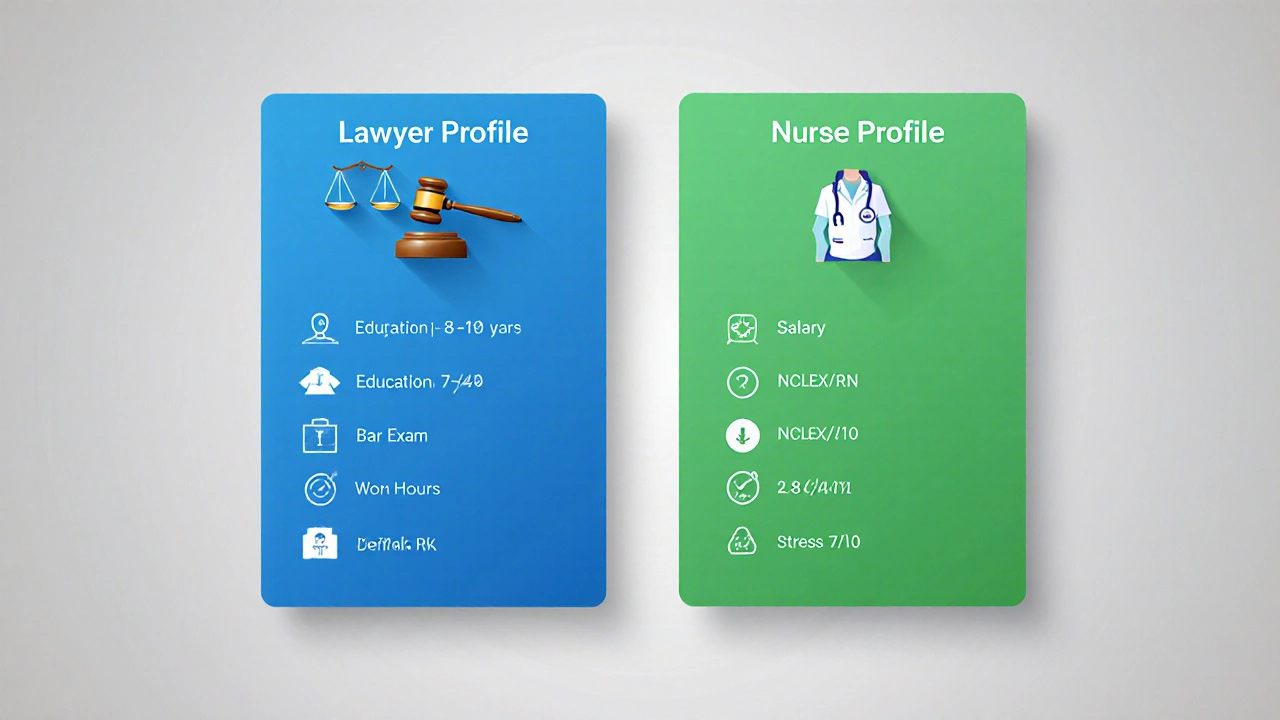Lawyer vs Nurse: Which Career Is Harder?

Lawyer vs Nurse: Difficulty Comparison Tool
Use this tool to evaluate key metrics that determine the difficulty of each career path. Select your priorities to get personalized insights.
Education: 7-9 years (Bachelor's + Law School)
Licensing: Bar Exam
Average Salary: $145,000
Work Hours: 50-60 hours/week
Stress Level: 8/10
Education: 2-4 years (ADN/BSN)
Licensing: NCLEX-RN
Average Salary: $78,000
Work Hours: 36-48 hours/week (shift-based)
Stress Level: 7/10
Your Career Recommendation
Based on your preferences, may be better suited to your needs.
People often wonder whether the legal world or the healthcare front line is tougher. The answer isn’t a simple yes or no - it depends on how you measure difficulty. In this article we break down the education, time commitment, earnings, stress levels and job outlook for both professions so you can see which path feels harder for you.
Quick Takeaways
- Law school typically takes 7‑9 years total (undergrad + JD) and adds a demanding bar exam.
- Registered nursing requires 2‑4 years of study plus the NCLEX licensure test.
- Lawyers often work 50‑60 hours a week, while nurses average 36‑48 hours with shift work.
- Median salary for lawyers (USD 145k) exceeds that of nurses (USD 78k), but student debt can be higher for lawyers.
- Both careers score high on stress, but the sources differ - courtroom pressure for lawyers, life‑and‑death decisions for nurses.
Education and Licensing
When we talk about a lawyer is a professional who advises clients on legal matters and represents them in court, the journey usually starts with a four‑year bachelor's degree, followed by three years of law school is a graduate program that awards a Juris Doctor (JD) degree and teaches case analysis, statutory interpretation, and advocacy skills. After graduating, aspiring lawyers must pass the bar exam is a comprehensive test that assesses knowledge of state-specific law and determines eligibility to practice law. The bar exam preparation can take several months of intense study and often requires a separate prep course.
By contrast, becoming a nurse is a healthcare professional who provides patient care, administers medication, and supports doctors in clinical settings typically involves earning an Associate Degree in Nursing (ADN, 2years) or a Bachelor of Science in Nursing (BSN, 4years). After the academic program, graduates must clear the NCLEX is the National Council Licensure Examination that certifies a candidate as a registered nurse in the United States. While the NCLEX is rigorous, its preparation time is usually shorter than that for the bar exam.
Time Commitment and Work Hours
Lawyers often face long, unpredictable hours. A junior associate at a large firm may log 55‑70 hours a week, with evenings and weekends consumed by billable work. Even seasoned attorneys report periods of intense workload during trial preparation or contract negotiations.
Nurses work in shifts that can be 8, 10 or 12hours, seven days a week. Though the schedule is more structured, rotating night shifts and overtime can disrupt sleep patterns. According to the American Nurses Association, the average nurse works about 38‑44 hours per week, but many hospital units require overtime during staff shortages.
Financial Considerations
Average annual earnings for lawyers in the United States hover around USD 145,000, according to the Bureau of Labor Statistics (2024). However, law school tuition averages USD 48,000 per year at private institutions and USD 28,000 at public schools, often leaving graduates with $150,000‑$200,000 in debt.
Registered nurses earn a median salary of about USD 78,000. Nursing programs are generally less expensive; a BSN at a public university averages USD 20,000‑$30,000 total, and many hospitals offer tuition assistance. Student loan debt for nurses typically ranges from $30,000 to $60,000.

Stress, Burnout, and Lifestyle
Stress sources differ between the two careers. Lawyers confront high‑stakes litigation, client expectations, and the pressure to meet billable hour targets. A 2023 survey by the American Bar Association found that 71% of attorneys reported significant stress, with 48% experiencing symptoms of burnout.
Nurses deal with emotional fatigue from caring for critically ill patients, frequent exposure to trauma, and staffing shortages. The same year, the National Institute for Occupational Safety and Health reported that 58% of nurses felt “very” or “extremely” stressed, with burnout rates climbing in intensive‑care units.
Both professions benefit from coping strategies: mentorship, regular exercise, and access to mental‑health resources. However, the nature of the stress-legal reasoning vs. bedside compassion-means personal resilience plays out differently.
Job Market and Growth Outlook
The legal job market is stable but competitive. The BLS projects a 4% growth for lawyers through 2034, roughly in line with overall employment. Demand spikes in specialized fields such as intellectual property, health law, and technology compliance.
Nursing enjoys a stronger growth trajectory, with a projected 9% increase in employment for registered nurses over the same period. An aging population and expanding healthcare services drive this demand, making nursing a relatively secure career choice.
Side‑by‑Side Comparison
| Metric | Lawyer | Nurse |
|---|---|---|
| Education Length | 7‑9years (BA + JD) | 2‑4years (ADN/BSN) |
| Licensing Exam | Bar Exam | NCLEX‑RN |
| Average Salary (USD) | 145,000 | 78,000 |
| Typical Weekly Hours | 50‑60 (often more) | 36‑48 (shift based) |
| Stress Index (1‑10) | 8 | 7 |
| Job Growth (2025‑2034) | 4% | 9% |
How to Decide Which Path Fits You
Choosing between law and nursing isn’t just about which is “harder.” It’s about aligning your strengths, values, and lifestyle preferences with the reality of each profession. Use this short checklist:
- Academic Interests: Do you enjoy reading dense statutes and constructing arguments (law), or studying anatomy and caring for patients (nursing)?
- Time Horizon: Are you willing to invest up to a decade for education and licensure (law) versus a shorter route (nursing)?
- Financial Goals: Consider tuition costs, expected debt, and salary trajectory.
- Work‑Life Balance: Assess whether you can handle irregular, high‑pressure hours (law) or shift work and night calls (nursing).
- Emotional Resilience: Think about how you handle courtroom drama versus bedside emergencies.
- Job Security: Look at market demand in your region; nursing often offers more entry‑level openings.
Talk to professionals in both fields, shadow a day in a law firm and a hospital ward, and weigh the pros and cons against your personal goals.
Next Steps and Troubleshooting
If you decide to pursue law, start by researching accredited law schools, preparing for the LSAT, and budgeting for tuition. If the bar exam feels daunting, consider a dedicated prep course and join a study group.
If nursing is your choice, decide between an ADN (quicker entry) or a BSN (broader opportunities). Many community colleges partner with hospitals for clinical rotations-use those connections to secure a job after graduation.
Common roadblocks include financial strain, burnout, and licensure anxiety. For financial hurdles, explore scholarships, federal aid, or employer tuition assistance. To combat burnout, set clear boundaries, seek mentorship, and prioritize self‑care.

Frequently Asked Questions
Which career has a higher entry‑level salary?
Lawyers typically earn more right out of school, especially those who join large metropolitan firms. Entry‑level lawyers can start at $70,000‑$120,000, while new registered nurses usually earn $55,000‑$70,000 depending on location and specialty.
Is the workload more predictable for nurses?
Nursing shifts are scheduled in advance, which gives a clearer picture of weekly hours. However, overtime, night shifts, and staffing shortages can make the schedule feel less predictable than a standard 9‑5 job.
Can I switch from nursing to law later in my career?
Yes. Many nurses pursue a JD to specialize in health law, medical malpractice, or policy advocacy. The reverse is also possible-lawyers often return to school for a nursing degree if they want direct patient interaction.
Which profession faces higher risk of physical injury?
Nurses encounter more physical hazards-lifting patients, exposure to infectious diseases, and occasional violent incidents. Lawyers generally work in office settings, so the risk of physical injury is lower.
What are the most common sources of burnout for each career?
Lawyers cite billable hour pressure, client demands, and long case cycles. Nurses point to staffing shortages, emotional fatigue from patient loss, and the physical toll of shift work.